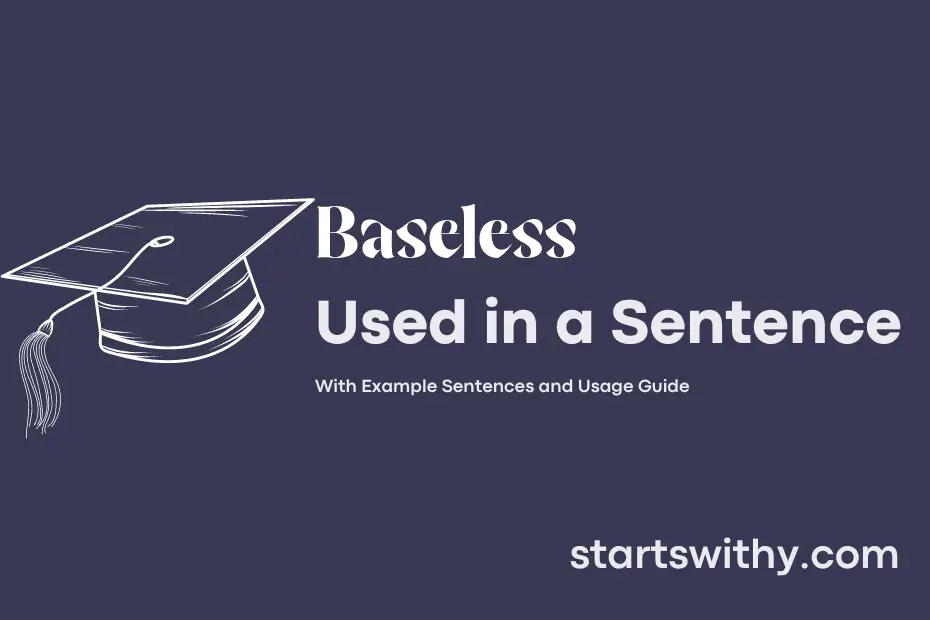Have you ever come across a baseless claim and wondered what it really meant? The term “baseless” refers to something that lacks a foundation or evidence to support it.
Often used to describe arguments, accusations, or beliefs that are without merit, baseless claims can be misleading and lack credibility. In various contexts, recognizing baseless statements is crucial in maintaining clarity and truthfulness in communication.
7 Examples Of Baseless Used In a Sentence For Kids
- The story about the flying elephants was baseless.
- The rumor about a treasure buried in the school was baseless.
- A baseless rumor can make someone feel sad.
- We should always ask questions to find out if something is baseless.
- I don’t believe in baseless stories.
- It’s important not to spread baseless information.
- A baseless accusation is not fair.
14 Sentences with Baseless Examples
- Baseless accusations were made against the student council president.
- The rumors about the upcoming exams being canceled were baseless.
- The teacher dismissed the student’s baseless excuses for not submitting the assignment on time.
- It’s important not to spread baseless gossip in college.
- The student’s fear of failing the exam was baseless as they had studied diligently.
- The party invites being kept a secret turned out to be baseless speculation.
- The professor’s claim that the assignment was plagiarized was completely baseless.
- The fear of the college shutting down due to financial issues was revealed to be baseless.
- The student’s concern about running out of study material was baseless as the library had ample resources.
- The notion that attending classes wasn’t necessary for good grades was baseless.
- Despite the baseless rumors, the college festival was a huge success.
- The belief that plagiarism wouldn’t be detected in the research paper was proven to be baseless.
- The student’s reluctance to ask for help due to a baseless fear of judgment hindered their academic progress.
- The students’ decision to boycott classes based on baseless claims led to unnecessary tension on campus.
How To Use Baseless in Sentences?
Baseless can be used in a sentence to describe something that lacks a foundation or source of support. For example, “The baseless rumors about her were quickly debunked by reliable sources.”
When incorporating baseless into a sentence, it is important to ensure that the context is clear and that the usage of the word aligns with its meaning. Using baseless correctly can help convey the idea that a statement or claim is without merit or evidence.
To use baseless effectively in a sentence, consider the following guidelines:
-
Grammatical Usage: Baseless is an adjective, so it should be used before a noun to describe it. For instance, “The accusation was baseless.”
-
Be Specific: Provide context or details to clarify why the claim or statement is considered baseless. This can help ensure that your sentence effectively conveys the meaning you intend.
-
Check for Clarity: Before using baseless in a sentence, make sure that it accurately reflects the lack of evidence or merit in the situation you are describing. This will help avoid any confusion about the meaning of your sentence.
By following these guidelines, beginners can confidently incorporate baseless into their sentences to communicate the idea that a claim or statement lacks a solid foundation or evidence.
Conclusion
In conclusion, the examples of sentences with “baseless” illustrated situations where claims or accusations were made without evidence or justification. These sentences demonstrated how the term “baseless” can be used to describe unsupported allegations or arguments that lack a solid foundation. By using this keyword in a sentence, it highlights the lack of credibility or validity in the statement being discussed, emphasizing the importance of evidence and sound reasoning in making claims.
Overall, the examples showcased the significance of avoiding baseless assertions and ensuring that one’s arguments are backed up by reliable evidence. By recognizing and addressing baseless claims, individuals can promote rational discourse and critical thinking, fostering a more informed and reasoned approach to discussions and decision-making.



